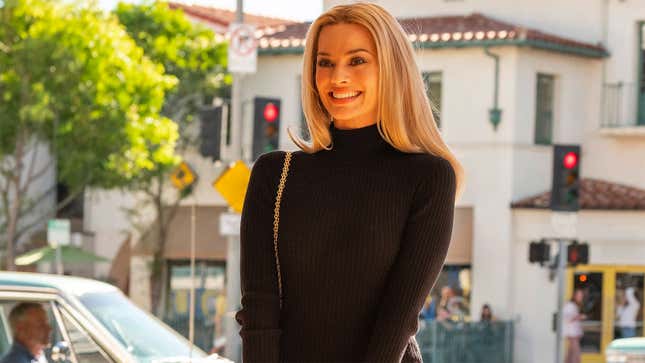Quentin Tarantino's Once Upon a Time In Hollywood Doubles Down on Shittiness Toward Women
EntertainmentMovies
Image: Columbia Pictures
At a Cannes Film Festival press conference in May, the New York Times culture writer Farah Nayeri observed that Quentin Tarantino hadn’t given many lines to Margot Robbie, one of the stars of the movie he was promoting, Once Upon a Time in Hollywood. “I guess that was a deliberate choice on your part, and I just wanted to know why that was that we don’t hear her actually speaking very much,” said Nayeri, who’d noted Robbie’s considerable talent in the preamble to her question. “Well, I just reject your hypotheses,” was Tarantino’s answer.
What an odd, petulant response. Unless Tarantino was referring to subjective things in Nayeri’s question (Robbie’s chops and/or the perceived choice he made to underuse them), which seems unlikely, there was no hypothesis in Nayeri’s quantitative and correct observation that Robbie (as Sharon Tate) doesn’t say very much in Once Upon a Time in Hollywood.
I didn’t take a tally of her lines when I screened the film earlier this week, but I would be surprised if they comprised more than 10 percent of the script. There are long stretches of time where she appears silently on screen, this glowing creature who the film seems to suggest is better seen than heard. On two occasions, she is seen from afar while men explain her life to us: Steve McQueen (Damian Lewis) describes Tate’s close, complicated dynamic with her ex-boyfriend Jay Sebring (Emile Hirsch) and husband Roman Polanski (Rafal Zawierucha), while toward the end of the film a voice over from Kurt Russell mentions the “touch of pregnancy-induced melancholy” Tate was experiencing the night of August 8, 1969, the last full day of her life, which was “later reported that it was the hottest night of the year and made her feel especially pregnant in all the worst ways,” whatever that means.
The audience learns about as much about Tate from these male characters as we do from Tate herself. The deepest probing of her interior life occurs when she watches The Wrecking Crew amongst civilians at a Los Angeles movie theater. After not being recognized by the box-office attendant, Tate eventually convinces the manager that she appeared in the mega-hit Valley of the Dolls and poses for a picture next to the Wrecking Crew poster. Inside the theater, she watches herself eagerly, and then more eagerly as she experiences the audience’s warm reception of her somewhat slapstick performance. Sharon Tate lived for the applause, is about all Tarantino’s flat-as-a-studio-backdrop script can muster. During this scene, Robbie appears with her bare feet up on the back of the seat in front of her, an explicit reference to Tarantino’s foot fetish, lest you confuse his leer for mere gaze.
-

-

-

-

-

-

-

-

-

-

-

-

-

-

-

-

-

-

-

-

-

-

-

-

-

-

-

-

-

-

-

-

-

-

-

-

-

-

-

-








































